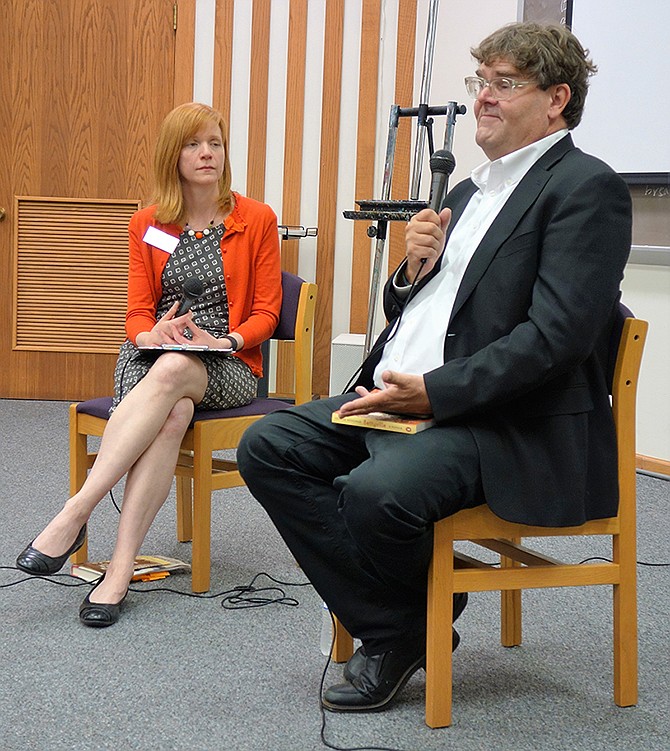As part of the One Read program, participants at an event Monday got a peek of the inner workings of an author.
George Hodgman, author of "Bettyville: A Memoir," said it was never his intention to write a memoir, but it was something that flowed naturally.
"I didn't set out to write a memoir," he said. "If you want to write, you spend a lot of time in your life picking up pieces and memories. Then, you get something that presses the button and moves you. You almost have to write a memoir because you don't know any way to express it."
Lauren Williams, co-chair of the One Read program, said it's exciting to have a homegrown author featured this year.
"Each year, the community helps select a book," she said. "We provide events and programs about the books. We're so pleased to be celebrating a Missouri author on our 15th year."
Writing a memoir, Hodgman said, also involves a lot of thought concerning how much of your or someone else's life you will share.
"Part of the decision is not a decision," he said. "Memoirs involve great negotiation. The first negotiation is not with you or what you reveal, but it involves those you are writing about."
The book, which shows his first person experience dealing with his dying mother, has some parts of her illness not shown in the book, Hodgman said.
"What I didn't show was her in the depth of her illness," he said. "I did not want to go into the moments she didn't want seen."
However, Hodgman said self-disclosure is a necessary part of the author's relationship with the reader.
"I knew from being an editor if you weren't honest about yourself, you didn't get the relationship with the reader," he added. "My agent (early on) read what I was doing and said 'one problem with the book is we don't really know who's telling the story.'"
In memoir writing, Hodgman added, the narrator is an essential character.
"You learn, if you're writing a memoir, I could not put myself in my mother's head," he said. "It had to be my story with my mother as a main character."
Opening the windows on his own life has created a special bond with those who have read the book, Hodgman said.
"It's been really sweet," he said. "When you read this book, you know a lot about me. People come up to me and tell me their stories on a very personal level. It's nice. It feels like you have a lot of friends you didn't know about."
On the other hand, Hodgman said, sharing your life in depth also causes the occasional awkward situation.
"I don't feel regretful about doing it," he said. "It's just if I'm with people, I'd sometimes rather forget they read the book. In order to maintain mental health, it's necessary to forget."
Before writing his memoir, Hodgman lived in New York City and worked as a book and magazine editor. Coming home to Paris, Missouri, he said, has a very different feel from the busy streets of the Big Apple.
"I think that is you live in Paris, Missouri, you can't be invisible," he said. "That's a nice thing. In New York, you don't really know all the lives your friends live. It's such a place where you can disappear. I'm very happy with where I currently am."
Hodgman said he is very fond of the small town life, and hopes his writing preserves it.
"These little towns have these characters I always wanted to write about," he said. "I'm mourning for the places every time they tear down a house; it drives me crazy."
Now as he enjoys the quiet life of a small town, Hodgman said he enjoys spending time with his dog.
"I'm crazy about that dog," he said. "He's the most spoiled dog in Paris. He thinks the house is his and he kicks me out of the bed. We have a good time."
As for future projects, Hodgman said he is not sure what direction he will be headed.
"I'm picking up scraps," he said. "Books begin with picking up scraps. You hear something you like, someone tells you a story, or you hear a little bit of history maybe. It's kind of like you get the chocolate chips before you make the cookie."
Melissa Alpers-Springer, a professor at William Woods, was in attendance Monday. She said hearing the author in person reinforced the message of the book.
"When he started to talk, I could hear his voice when I was reading," he said. "It has the same cadence and warmth. I'm from a small town, too."
Alpers-Springer said reading good literature is an essential part of her life.
"It's vital for me," she said. "It's a way to connect with places and people. As a theater person, we try to connect and tell people stories. It's a way for us to connect and empathize."
The reception from native mid-Missourians, Hodgman said, has been one of the prouder moments of his career.
"They have been so nice," he said. "They think I've made a lot of money, so they may have little theories about things, but they've been really nice. I really feel like they are proud of me."

